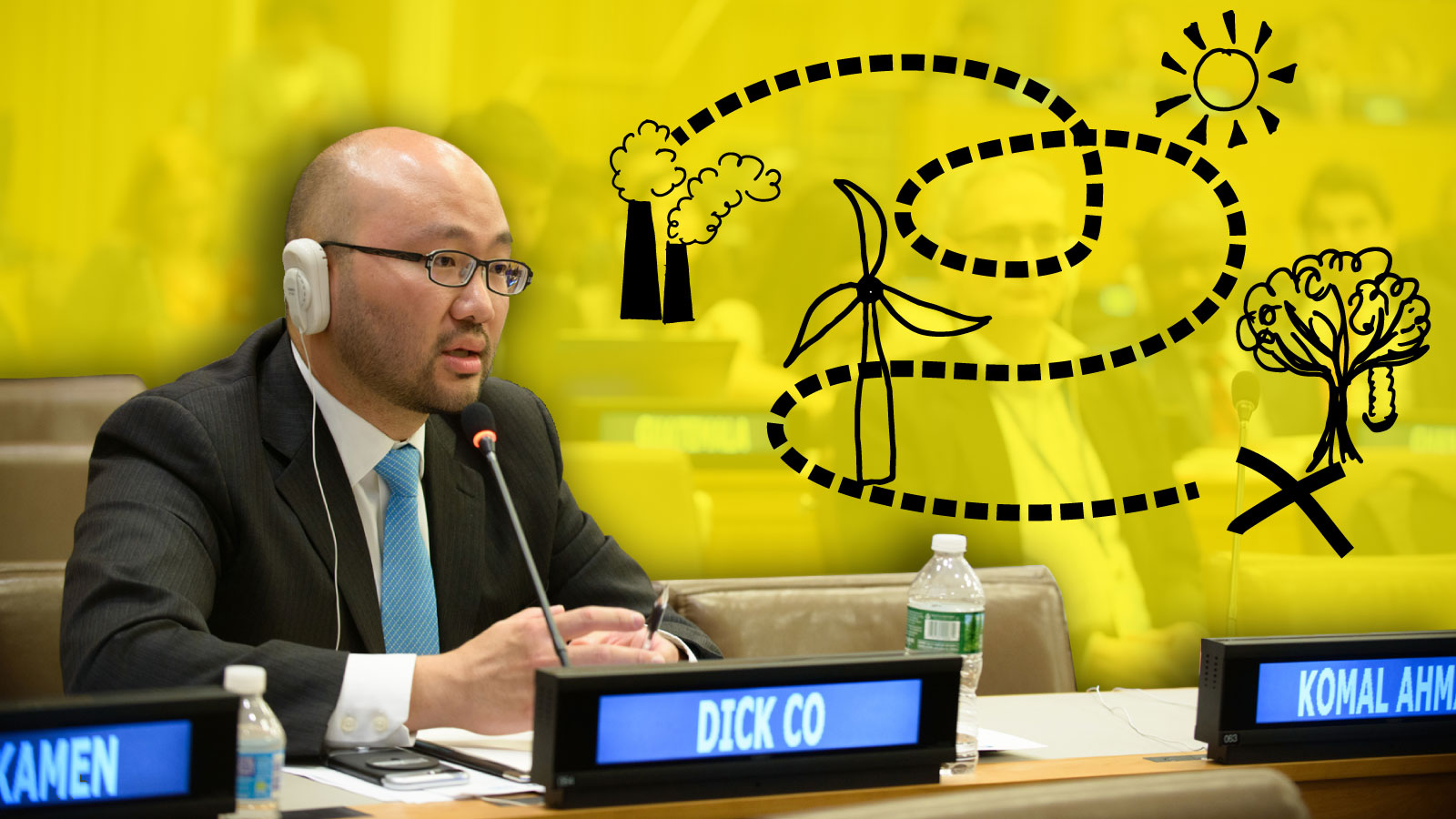Like many children of the ’80s, chemist Dick Co was both fascinated and traumatized by “Gremlins,” the iconic dark comedy featuring cuddly pets that transform into killer monsters when their owners break one of three rules.
The main character in the film, Billy, receives a furry creature called a “mogwai” from his father as a Christmas present. His father tells him the rules for mogwai care: Keep it out of direct sunlight, don’t let it touch water, and definitely don’t feed it after midnight.
Predictably, one of the rules is soon broken. With a splash of water, one mogwai becomes six. Then the mogwai transform into reptilian gremlins and embark on a mischievous and ultimately murderous rampage across town before they’re brought back under control.
As an adult, Dick sees parallels between the rules for gremlin care and the steps people need to take to tame the beast that is climate change. And the film informs his optimism that people will ultimately solve the problem.
“There were very simple rules to follow,” he says. “With climate change, the science is also simple.”
At its essence, climate science says that when people add heat-trapping gases to the atmosphere, temperatures rise. The climate gets less stable, transforming the world into a planet beset by rapidly rising seas, raging storms, and deadly heat waves.
The climate optimist
Born in the U.S. and raised in heavily polluted Taiwan, Dick’s earliest outdoor experiences meant needing to wipe soot and exhaust from his face. Years later, he’s helping forge a cleaner future for people and planet as director of Argonne National Laboratory’s Chain Reaction Innovations program, an accelerator program that supports promising climate technologies.
Now based in Evanston, Illinois, the Harvard-trained scientist has decades of climate data study under his belt. He worries about climate change, but he leans toward optimism — with a caveat.
“I feel like having a diversity of optimists and pessimists is important. Optimism gives us hope and audacity to go out and make change,” he says. “But pessimists help us expose the gaps in preparedness.”
Dick’s modus operandi, attributed to Maya Angelou, is simple: “Do the best you can until you know better. Then when you know better, do better.”
Take the people who discovered the applications of fossil fuels, now known to cause global warming.
“Their work improved life expectancy and provided us incredible convenience,” he says. “I don’t feel it helps me to look back at the last 100 years and go, ‘Well, we shouldn’t have done that.’ But now we know better about the impacts of that on climate, so we can do better.”
Dick’s three climate care rules
If Gremlin care rules include no direct light, no water, and no feeding after midnight, Dick’s climate rules include the following.
1) Use less stuff. For generations, Americans lived in smaller homes, didn’t fly or drive as much, and ate locally grown, seasonal food as a rule.
By focusing on the benefits of simpler, less carbon-intensive lifestyles, people can rethink what it means to live well. And over time, they can reduce carbon emissions while still achieving the fundamental goal of providing good lives for their families and their children’s children.
Read: Six behavior changes that can heal people and the planet
2) Play the long game, adjusting course as needed. It took humanity 150-200 years to reach today’s extremely high concentration of carbon dioxide in the atmosphere, Dick says, and it may take as much time to get back to a safe level. Even the most consequential steps people take now could take decades, if not longer, to yield positive effects. So decisive action plus perseverance and patience are key. But people also need to adapt as they learn more.
3) Focus on people. Humans caused the problem, and they hold the solutions, Dick says. And people can’t solve planetary challenges without also addressing human needs.
Dick says that thoughtful climate action will play an essential role in enhancing people’s lives — and vice versa. To achieve the more prosperous, harmonious, healthy communities he believes are possible, Dick urges people to set aside ideology and argument and to work with each other with compassion.
“I think it’s about connecting with people,” Dick says. “It’s not about ideology. It’s not about, ‘Why don’t you see the facts? Why aren’t you doing more?’ It’s about what people need in their lives and what sustains them, from an economic standpoint to a societal, cultural, and spiritual level.”
The outlook is bright, Dick says — because we are
On a recent dark day for climate leaders, the Supreme Court curbed the power of the Environmental Protection Agency to restrict industry’s carbon emissions. Despite the blow, Dick’s pragmatic optimism remained unwavering.
“This is part of the data-collection process,” Dick says. “Yesterday, I learned that doing it by jurisdiction is maybe not the way — we can fight all we want, but one president and three appointees can roll it back overnight. That’s new data.”
“Still,” he adds, “I am seeing positive change in how people and communities are rising to this challenge.”
He points to promising innovation happening across sectors, from low-carbon concrete and electric vehicles to plant-based meat and community composting.
He expresses hope that people will realize that following basic climate rules is actually just good for us.
For example, he points out that consuming less means people will spend less and have more money in their pockets. Reducing energy use can also help save money.
“I’m hopeful that we will see more of those self-motivating actions that are good for the people doing it and also the planet,” he says – just like in “Gremlins,” which (spoiler alert), ended peacefully for humans and mogwai alike once the main characters realized the value of working together to follow the rules.
“I have faith that in the end,” he says, “we will figure this out.”


